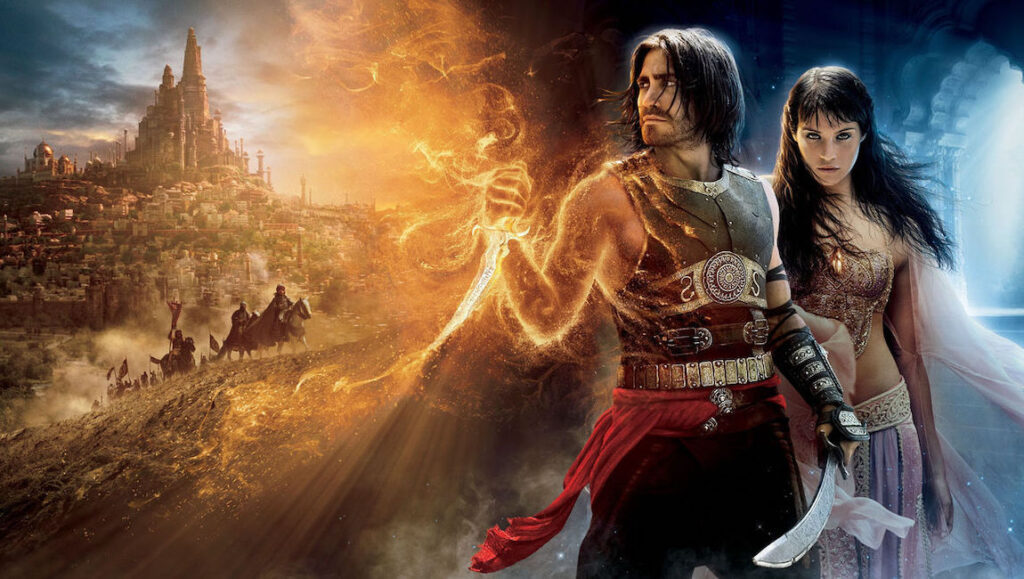A witless, calculated attempt to start another Pirates of the Caribbean-style franchise (this one based on a video game series), Mike Newell’s Jerry Bruckheimer-produced Prince of Persia: The Sands of Time lacks even the supposed charm of The Mummy and its descendants. Whereas those films, irrespective of quality, were at least securely placed in a world of pulpy, good-humored adventure, Prince of Persia is incredibly self-serious, adhering to the curious recent trend of shoehorning obvious and barely-sketched allusions to current political events into action blockbusters. The story concerns Prince Dastan (Jake Gyllenhaal), the favorite adopted son of the wise King of Persia, who, after spearheading a successful invasion of neighboring Alamut, discovers that the illicit weapons the enemy was supposed to possess never existed. To make matters worse, he’s framed for the murder of his benevolent adoptive father and forced to go on the run to clear his name. Along the way, he enlists the help of a sexy princess (Gemma Arterton, playing the same Hottie the Explainer role she did in this spring’s Clash of the Titans) and a tax-dodging, slave-owning ostrich racer (Alfred Molina). As it turns out, Dastan’s nefarious uncle (Sir Ben Kingsley, continuing to slum it) is behind the whole thing, seeking the retrieval of a mysterious dagger with the power to turn back time and make him the King of Persia in his dead brother’s stead.
Or something. That meager plot description constitutes nearly an entire hour of screen time, making Prince of Persia not just silly but boring. Worse, the film’s central gimmick — Dastan’s use of the magic knife to correct any mistake by jumping back in time for a moment —completely robs the already sluggish story of what little urgency it manages to manufacture. Every time there’s a surprising plot twist or stakes-raising turn of events, a bunch of CGI sand comes out of the dagger and puts everything back the way it was a minute ago, rendering the film completely inert. Its vague swipes at relevance (WMD, anti-government sentiment) wouldn’t feel so cheap if there were any real conscience behind them, but the idea that Newell or Bruckheimer have anything honest to say on the subject is defused by the almost complete lack of Middle-Eastern actors populating this fantastical Arab kingdom. Casting the likes of Gyllenhaal, the admittedly gorgeous Arterton, and an appropriately hammy Kingsley is clearly meant to recall Fairbanks in The Thief of Baghdad, but this just draws attention to the movie’s ineffective barrage of CGI sandstorms and clumsily edited parkour action scenes. I could only pick out one scene featuring actors of non-Caucasian ethnicity, and it’s a fight consisting of two guys throwing CG knives at each other for three minutes.
Directed in a barely workmanlike fashion by Newell (also responsible for Donnie Brasco and Harry Potter and the Goblet of Fire), Prince of Persia lurches from golden-toned sandscape to golden-toned cityscape while characters spout exposition to reorient the audience after each time-travel-induced plot reset. Occasional fight scenes are industry-standard, i.e., overly edited rather than carefully photographed. With no discernible vision other than Bruckheimer’s patented high-gloss popcorn aesthetic, Prince of Persia makes one long for the hyperactive, batshit-macho bravado of a Michael Bay or a Tony Scott to spice up the proceedings. It should come as a shock to absolutely nobody that this nonsense culminates in a battle of greenscreens and pixels. There are some last-minute attempts at upping the drama by killing off a couple of major characters, but anyone paying attention can guess how that pans out. What’s truly surprising is the film’s conclusion that very little of what took place onscreen actually had any consequence at all, leaving the audience with a story that not only bored them but also appears to have never actually taken place.


Comments are closed.